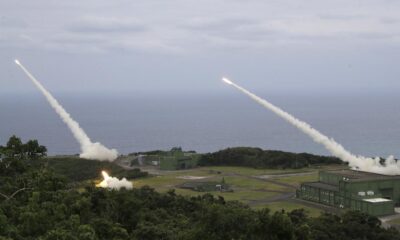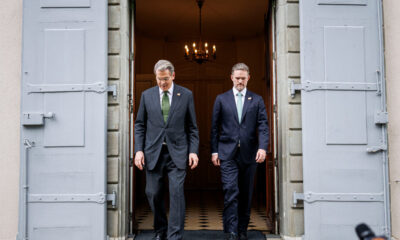Breaking News
Trump’s Crimea Proposal Would End a Decade of U.S. Resistance

Concerns arose in Ukraine during President Trump’s first term that he might acknowledge Russian control over Crimea, a peninsula Moscow annexed in 2014. Despite initial statements suggesting otherwise, Mr. Trump ultimately maintained the nonrecognition policy towards Crimea, as reiterated by Secretary of State Mike Pompeo in 2018.
However, a recent peace proposal put forward by the Trump administration includes recognizing Crimea as part of Russia, marking a significant shift in American policy that favors Moscow. This proposal has sparked criticism from experts like Daniel Fried, who warn against legitimizing Russia’s annexation of Crimea through formal recognition.
While some argue that acknowledging the reality on the ground in Crimea is necessary, others, including Senator Marco Rubio, caution against setting a precedent for authoritarian regimes to change borders by force. Ukrainian President Volodymyr Zelensky firmly rejects any recognition of Crimea as Russian territory, emphasizing the importance of upholding Ukraine’s sovereignty.
The ongoing debate surrounding Crimea highlights the complexities of the situation, with Russia solidifying its control over the region since the 2014 annexation. The strategic significance of Crimea, particularly its port city of Sevastopol, adds another layer to the dispute.
President Putin’s strong attachment to Crimea, coupled with historical claims to the region, further complicates efforts to resolve the conflict. The potential shift in U.S. policy towards recognizing Crimea as Russian territory has drawn comparisons to past instances of territorial disputes and recognition.
As discussions continue on the fate of Crimea, the implications of recognizing Russian control over the region remain a contentious issue. The diverging views on how to approach the Crimea question reflect broader geopolitical tensions and historical rivalries in the region.
While some argue for pragmatism in addressing the situation, others emphasize the importance of upholding international principles and Ukraine’s sovereignty. The outcome of these deliberations could have far-reaching consequences for the region and beyond.
-

 Destination8 months ago
Destination8 months agoSingapore Airlines CEO set to join board of Air India, BA News, BA
-

 Breaking News10 months ago
Breaking News10 months agoCroatia to reintroduce compulsory military draft as regional tensions soar
-

 Gadgets3 months ago
Gadgets3 months agoSupernatural Season 16 Revival News, Cast, Plot and Release Date
-

 Tech News12 months ago
Tech News12 months agoBangladeshi police agents accused of selling citizens’ personal information on Telegram
-

 Productivity11 months ago
Productivity11 months agoHow Your Contact Center Can Become A Customer Engagement Center
-

 Gadgets4 weeks ago
Gadgets4 weeks agoFallout Season 2 Potential Release Date, Cast, Plot and News
-

 Breaking News10 months ago
Breaking News10 months agoBangladesh crisis: Refaat Ahmed sworn in as Bangladesh’s new chief justice
-

 Toys12 months ago
Toys12 months ago15 of the Best Trike & Tricycles Mums Recommend























